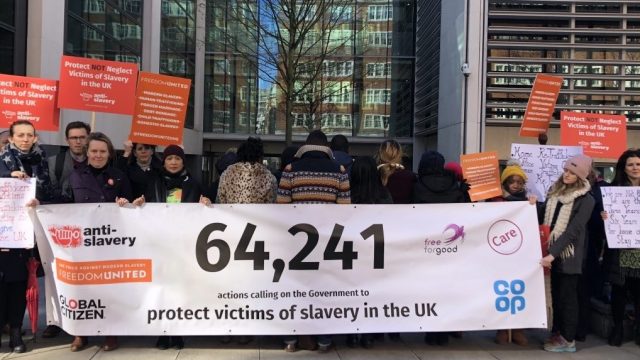The UK Home Office has officially scrapped its ‘nonsensical’ policy of limiting victims of modern slavery to 45-days of support. Instead, it will develop a “needs-based system for supporting victims of trafficking.”
Notably, court documents reveal that the government “has no intention of reapplying the ‘45-day rule’” or any other time limit on its support.
The policy change is a major breakthrough for trafficking survivors and advocates who have campaigned for years to expand support. We at Freedom United ran a campaign to guarantee support for survivors that garnered over 68,000 signatures, delivering the petition to 10 Downing Street earlier this year.
The Guardian reports:
The existing policy – which under the Modern Slavery Act provides safe housing, counselling and financial support for up to 45 days to people in the UK who have been formally identified as victims of slavery or trafficking – was suspended in April by a high court judge, who ruled that it risked causing “irreparable harm to very vulnerable individuals”.
“The home secretary’s nonsensical policy on support has finally ended – victims of trafficking and modern slavery will no longer be left at the mercy of the 45-day cliff-edge drop in support,” said Ahmed Aydeed, public law director at Duncan Lewis, the law firm that challenged the Home Office policy.
Documents presented to the court and seen by the Guardian show that the Home Office conceded this month that “some aspects of the [current] system are unsatisfactory” and that survivors’ recovery “may vary from individual to individual and cannot be delimited by time alone”.
The policy reversal follows legal challenges brought against the Home Office by two victims of trafficking, who argued that cutting off support after 45 days would leave them destitute and vulnerable to re-trafficking.
“For years the UK’s referral mechanism has rescued survivors only to throw them out of support, once they are conclusively recognised as trafficked, after an arbitrary and short period of time,” explained Barnett.
“As a result we have heard horrific stories of many victims, particularly male victims, ending up destitute and then being re-trafficked. Now they will not be forced out of support if they are not yet ready.”
The Home Office has indicated that needs the help of “expert stakeholders” in developing the new tailored support system. And civil society is ready to work together to make this possible.
“In order to design this system and implement it effectively, collaboration between civil society and a range of government departments will be required. Survivor voices must be heard and their needs must be fully understood,” said Kate Garbers of Unseen.






Freedom United is interested in hearing from our community and welcomes relevant, informed comments, advice, and insights that advance the conversation around our campaigns and advocacy. We value inclusivity and respect within our community. To be approved, your comments should be civil.